Overview
The article highlights the emotional challenges that healthcare providers face daily. With mounting administrative tasks, such as scheduling, billing, and documentation, many feel overwhelmed, which can detract from their ability to provide compassionate patient care. How can we lighten this burden?
Gen health AI emerges as a promising solution, automating these tasks and allowing providers to focus more on what truly matters—patient care. Evidence from case studies shows significant improvements in efficiency and job satisfaction among healthcare professionals. Imagine a workplace where providers feel fulfilled and patients receive the attention they deserve.
Ultimately, this transformation enhances the quality of service delivery. It's time to embrace these advancements in healthcare administration. Let’s explore how we can support each other in this journey toward a more compassionate and efficient healthcare environment.
Introduction
In the evolving landscape of healthcare, the integration of artificial intelligence is not merely a trend; it is a transformative force reshaping the way providers deliver care. Have you ever felt overwhelmed by administrative tasks that take time away from what truly matters—patient care? From streamlining these burdens to enhancing diagnostic accuracy, AI technologies are proving indispensable in improving patient outcomes and operational efficiency.
Platforms like CosmaNeura are at the forefront of this revolution, automating essential processes that allow healthcare professionals to focus on their patients. As the sector grapples with challenges such as physician burnout and the need for timely interventions, the adoption of AI solutions is paving the way for a more compassionate, efficient, and patient-centered healthcare system.
This article delves into the multifaceted applications of AI in healthcare, highlighting its potential to revolutionize everything from disease detection to personalized care strategies. Together, we can explore how these advancements can support you in your vital work.
CosmaNeura: Streamlining Administrative Tasks for Healthcare Providers
In today's healthcare landscape, many providers face overwhelming administrative burdens that can detract from their primary mission: patient care. CosmaNeura's groundbreaking platform addresses these emotional challenges by automating essential tasks such as client intake, scheduling, and triage. By enhancing administrative efficiency, doctors can alleviate the weight of time-consuming responsibilities, allowing them to focus more on what truly matters—their patients.
Imagine the difference this could make in your daily practice. With automation, medical professionals can significantly reduce the time spent on administrative tasks. This shift not only enhances the quality of service delivery but also fosters a more compassionate, patient-focused approach. In fact, the implementation of AI solutions like CosmaNeura has freed up an impressive 238 years of work in a remarkably short time, showcasing the efficiency gains that these technologies can provide.
Furthermore, by streamlining workflows, CosmaNeura aligns with the ethical standards upheld by faith-focused providers. This ensures that care remains rooted in compassion and adherence to Catholic teachings. As AI's role in medicine continues to expand, platforms like CosmaNeura, utilizing gen health ai, are becoming essential tools for contemporary medical practice. Are you ready to embrace a solution that can transform your practice? Let’s work together to create , where providers can focus on delivering the best care possible.
AI Interpretation of Brain Scans: Enhancing Diagnostic Accuracy
Gen health AI technologies are transforming the way we interpret brain scans, resulting in meaningful improvements in diagnostic accuracy. By harnessing advanced algorithms, CosmaNeura's gen health AI platform can analyze complex imaging data to identify abnormalities that may escape human detection. This capability not only accelerates the diagnostic process but also ensures that individuals receive timely and appropriate interventions, which is crucial for conditions like strokes and brain tumors, highlighting the importance of gen health AI in overcoming the challenges posed by the industry's resistance to innovation.
Many medical providers, particularly physicians, often feel apprehensive about adopting new technologies, concerned about potential impacts on the quality of care and patient relationships. Traditional accelerators frequently fall short in providing the tailored support that medical startups need to overcome these hurdles. CosmaNeura recognizes these obstacles and is committed to delivering the specific assistance necessary to empower medical startups, especially with advancements in gen health AI for brain imaging, which have shown impressive accuracy rates and can achieve diagnostic precision comparable to that of experienced radiologists.
CosmaNeura's commitment to ethical medical practices ensures that not only enhance diagnostic processes but also align with the moral principles of Catholic teachings, emphasizing compassionate care. Additionally, real-world applications of gen health AI from CosmaNeura in this field are already yielding positive results. For instance, a medical professional utilizing the gen health AI platform from CosmaNeura reported a significant reduction in the average time to diagnosis for stroke patients, leading to improved outcomes and greater satisfaction.
This aligns with our mission to alleviate the administrative burdens faced by medical providers, allowing them to focus on delivering exceptional clinical experiences; as the medical landscape evolves, integrating gen health AI into diagnostic imaging not only streamlines workflows but also ensures that patient well-being remains a top priority. Our ongoing commitment to harnessing the potential of gen health AI reflects a broader movement towards leveraging technology to address complex medical challenges, ultimately enhancing the quality of care provided to individuals while upholding the ethical standards that guide our practice.
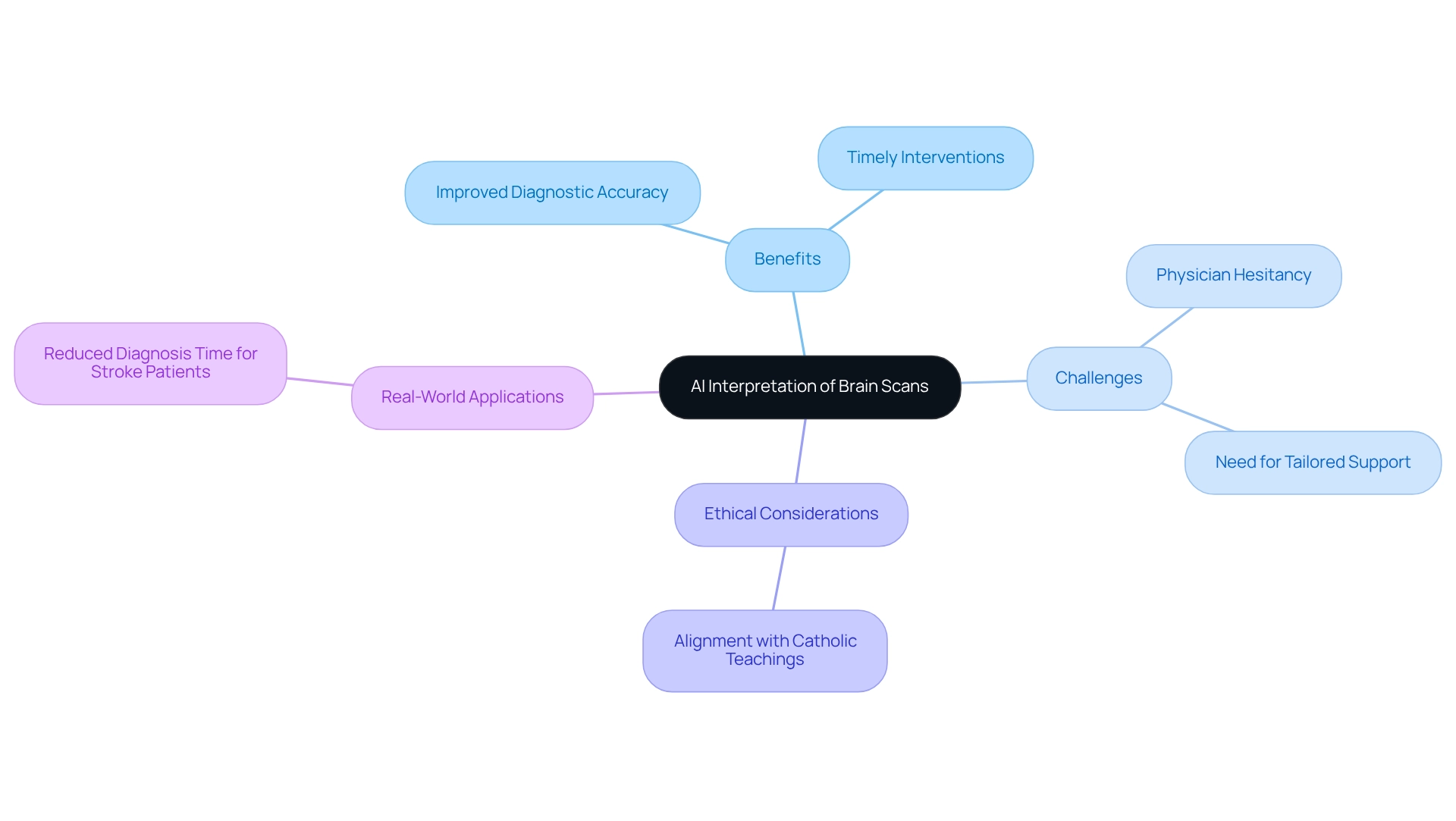
AI Detection of Bone Fractures: Improving Emergency Care Outcomes
AI systems have truly transformed the detection of bone fractures, achieving remarkable accuracy that often surpasses that of human radiologists. This advancement is particularly crucial in emergency situations, where timely diagnosis can dramatically influence treatment outcomes. For instance, a recent study on skull fracture detection using deep learning demonstrated a sensitivity of 91.4% and specificity of 87.5%. These findings highlight how AI can greatly enhance clinical practices, enabling medical professionals to make informed decisions swiftly, ultimately leading to improved outcomes for individuals.
In emergencies, where the elbow is a common site of medical errors in pediatric fractures—representing 77% of all cases, as observed by Vinz et al.—the incorporation of AI into radiology workflows becomes even more essential. By accelerating the diagnosis process, AI ensures that individuals receive timely attention for fractures, improving the efficiency of emergency services and addressing the challenges of disjointed medical delivery. Furthermore, AI tools can alleviate some of the administrative pressures that contribute to physician burnout, allowing healthcare providers to focus more on individual patient care rather than documentation.
Statistics indicate that diagnostic confidence increases with AI assistance, with a mean change of 0.18. This enhancement leads to more precise decision-making for medical professionals, enabling them to prioritize treatment based on reliable data. As gen health ai continues to progress, its role in emergency treatment for bone fractures is set to expand, providing healthcare professionals with robust tools to enhance diagnostic precision and support. Looking ahead, ongoing advancements in gen health ai technology are expected to refine , ultimately reshaping emergency medicine and enhancing patient-focused services. Moreover, the integration of telemedicine and remote monitoring can further improve access to care, ensuring that individuals receive timely interventions even in challenging situations.
How can we embrace these innovations to better serve our patients and support each other in this journey?
AI in Ambulance Needs Assessment: Optimizing Emergency Response
AI-driven tools are transforming the way we assess ambulance needs in real-time, significantly improving the dispatch process. By leveraging information on traffic patterns, individual conditions, and historical response times, these innovative systems can recommend the most efficient routes and allocate resources accurately. This capability not only reduces response times but also enhances the overall effectiveness of emergency medical services.
Consider a recent study titled 'Home Healthcare Routing-Scheduling Optimization.' It revealed that prioritizing individuals based on the urgency of their medical conditions led to increased satisfaction and reduced logistics costs. Isn't it reassuring to know that AI can enhance customer satisfaction by ensuring that client issues are addressed promptly and accurately? This reflects the broader impact of gen health ai across various sectors. As we look toward 2025, the integration of gen health ai in emergency medical services is becoming increasingly vital. Continuous advancements are being made to enhance emergency responses and improve outcomes for those in need. However, it's important to acknowledge that further studies are necessary to validate these proposed ambulance routing models in real-world scenarios.
Philip Martyn from Marchex shared a thought-provoking perspective: 'In this new era of , the true worth of conversation analytics for businesses lies less in the sheer volume of data they can easily process, and more in the richness and applicability of the signals produced.' This insight highlights the importance of effectively leveraging gen health ai in healthcare, particularly in emergency response.
How can we ensure that these advancements translate into better care for our communities? By embracing these technologies, we can work together to create a more responsive and compassionate healthcare system.
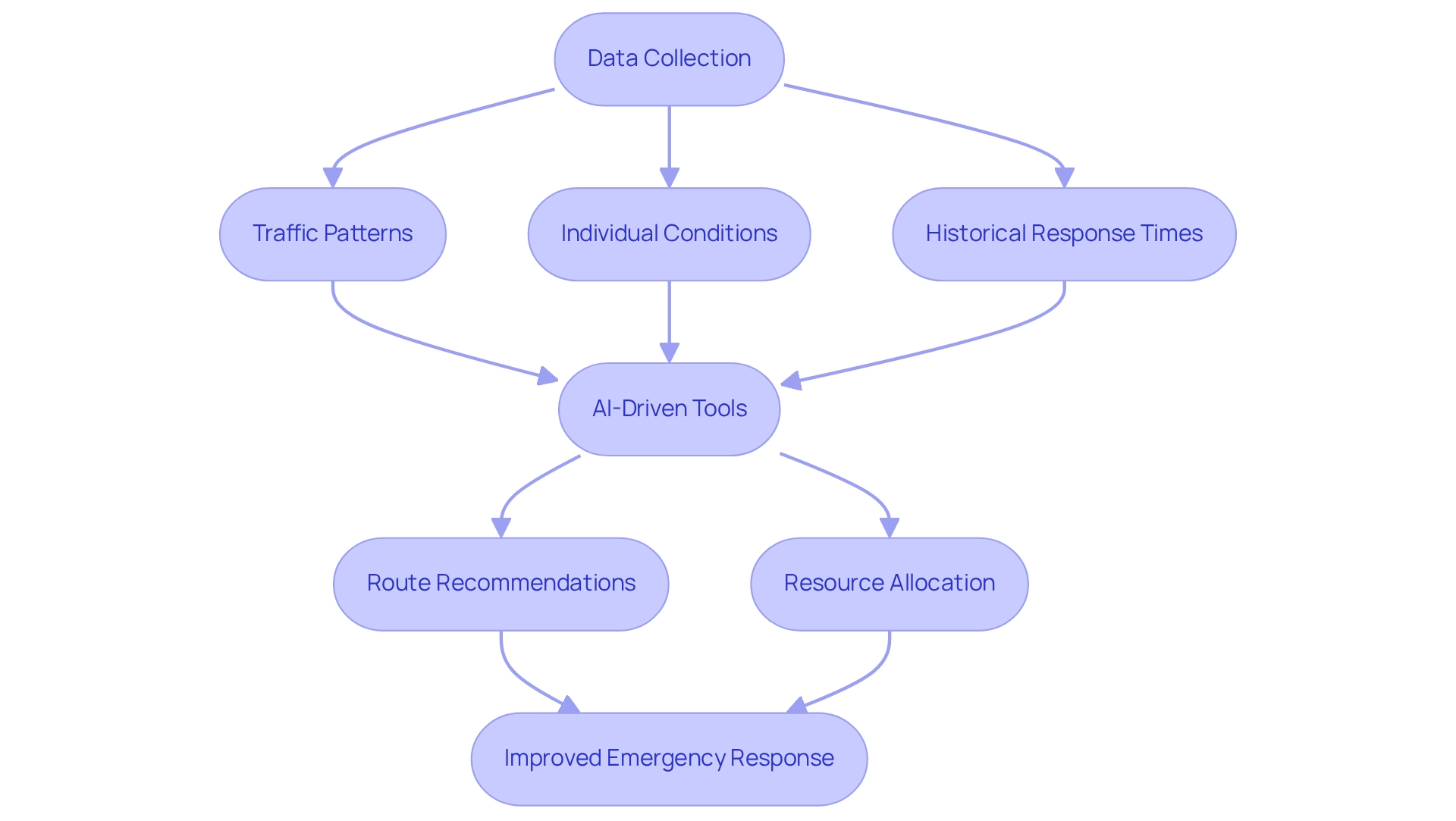
AI Disease Detection: Identifying Early Signs for Timely Interventions
AI technologies are profoundly changing the landscape of disease detection, offering hope by identifying early signs of critical conditions like cancer, diabetes, and cardiovascular diseases. Imagine the relief of knowing that potential health issues can be flagged before they escalate, thanks to gen health ai's meticulous analysis of individual data and medical histories. This proactive approach not only fosters peace of mind but also empowers healthcare providers to intervene in a timely manner, significantly improving outcomes for individuals, especially through the remarkable capabilities of gen health ai in predictive analytics.
By forecasting disease progression and pinpointing individuals at higher risk, these systems enable healthcare professionals to take action before conditions worsen. For instance, the UK National Health Service's AI triage system for chest X-rays has shown impressive results, processing over 650,000 X-rays in its first year and reducing delays in reporting critical findings by 91%.
Such advancements illustrate the potential for early disease detection to lead to substantial decreases in treatment expenses, as timely interventions can prevent the progression of diseases, emphasizing that the integration of is essential as we navigate through the evolving medical landscape. This shift towards personalized, preventive, and technology-driven care not only enhances the quality of care for individuals but also alleviates some of the burdens faced by healthcare providers.
Are you ready to embrace this change and explore how AI can support your practice? Together, we can ensure a healthier future for all.
Clinical Chatbots: Guiding Healthcare Decisions and Enhancing Patient Engagement
Clinical chatbots are swiftly becoming vital components of medical systems, offering individuals immediate access to important information and support. These tools powered by gen health ai play a significant role in individuals' medical journeys by answering questions, scheduling appointments, and providing initial assessments. As we look towards 2025, the integration of chatbots is expected to greatly enhance user engagement, with studies suggesting that effective utilization of these tools can lead to a 30% increase in satisfaction. By ensuring that individuals feel supported and informed throughout their treatment process, chatbots not only enrich the experience for those receiving services but also allow medical professionals to focus on delivering high-quality care.
Consider a recent case study that showcased how a healthcare provider adopted a chatbot to gather client feedback, resulting in a 25% improvement in service delivery. This aligns with the understanding that prioritizing individuals' needs is crucial for refining treatment strategies. As Don Berwick, former Administrator of the Centers for Medicare and Medicaid Services, wisely stated, "Listening to individuals is the cornerstone of care centered on individuals."
Furthermore, the UK government has allocated 13 million pounds (approximately $16.5 million) to foster the development of AI in medical services, underscoring the growing investment in these transformative technologies. As the landscape of medical AI continues to evolve, the role of clinical chatbots powered by gen health ai in guiding medical decisions and enhancing client engagement will only expand, making them indispensable in .
AI for Healthcare Administration: Reducing Provider Workload
Gen health ai technologies are revolutionizing medical administration by automating essential tasks like scheduling, billing, and documentation. This transformation significantly alleviates the administrative burdens faced by medical practitioners, allowing them to dedicate more time to caring for individuals. As a result, providers often find enhanced job satisfaction, which is vital for fostering a compassionate healthcare environment, and the thoughtful application of gen health ai in clinical documentation has demonstrated its ability to reduce physician burnout and strengthen relationships with individuals by streamlining workflows.
For instance, gen health ai technology promises to optimize time management, paving the way for meaningful patient interactions that are crucial for improving patient experiences and outcomes. Moreover, medical leaders express optimism about AI's potential to reshape the industry. Projections indicate that by 2030, aims for 90% of its environment to be in the cloud. This shift not only enhances the effectiveness of medical delivery but also aligns seamlessly with the mission of faith-centered organizations, ensuring that compassionate care remains at the forefront of their practice.
However, it is essential to acknowledge that 53% of Americans believe AI cannot replace the invaluable experience of a human health specialist, and 43% favor human interaction and touch. This highlights the need for a balanced strategy in integrating AI into medical services. How can we navigate this evolving landscape while ensuring that the human element of care is preserved? Together, we can explore solutions that honor both technological advancements and the irreplaceable value of compassionate human connection.
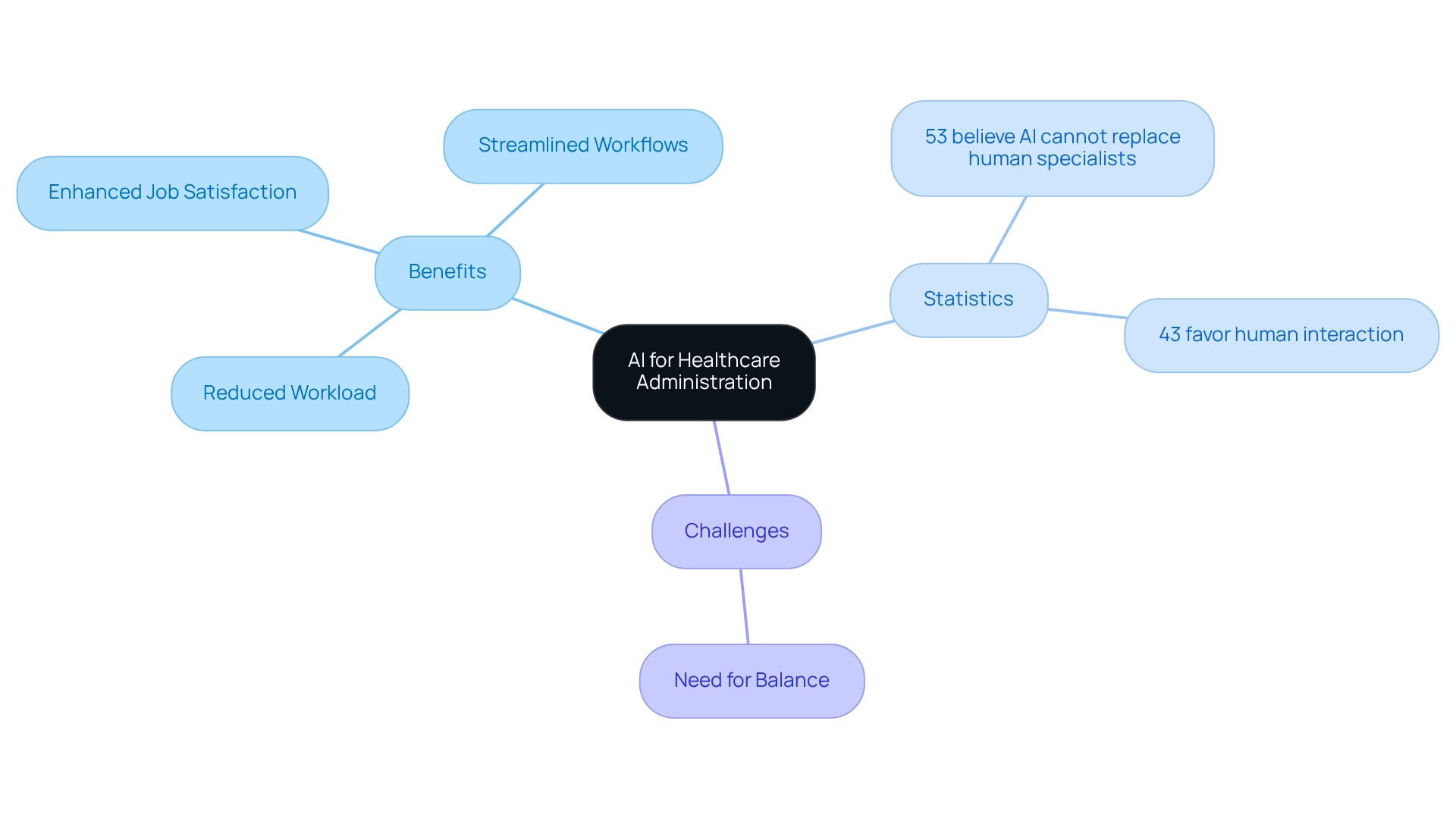
AI in Telehealth: Real-Time Transcription and Documentation
Gen health ai is transforming telehealth, offering real-time transcription and documentation during virtual consultations. This remarkable technology allows healthcare providers to concentrate fully on their interactions with clients, alleviating the burdens of manual note-taking. By automating documentation, CosmaNeura's gen health ai improves the accuracy of health records, which is vital for effective follow-up support.
In 2025, the impact of real-time documentation on telehealth outcomes is evident. Research shows that 92.1% of individuals felt their health concerns were adequately addressed through telehealth services. This statistic underscores the effectiveness of CosmaNeura's solutions. Furthermore, gen health ai in telehealth can utilize predictive analytics to uncover patterns and foresee health events, paving the way for more personalized treatment plans.
As highlighted in a recent case study, AI algorithms have shown exceptional accuracy in predicting health occurrences, such as malaria outbreaks, guiding tailored treatment strategies. As AI continues to evolve, its role in enhancing documentation precision and efficiency through gen health ai will be crucial for improving for both practitioners and patients. By embracing these advancements, CosmaNeura is committed to ensuring that its gen health ai solutions not only elevate the quality of care but also align with the mission of serving all individuals effectively and equitably.
How can we further support you in navigating these changes? Together, we can make a difference in the lives of those we care for.
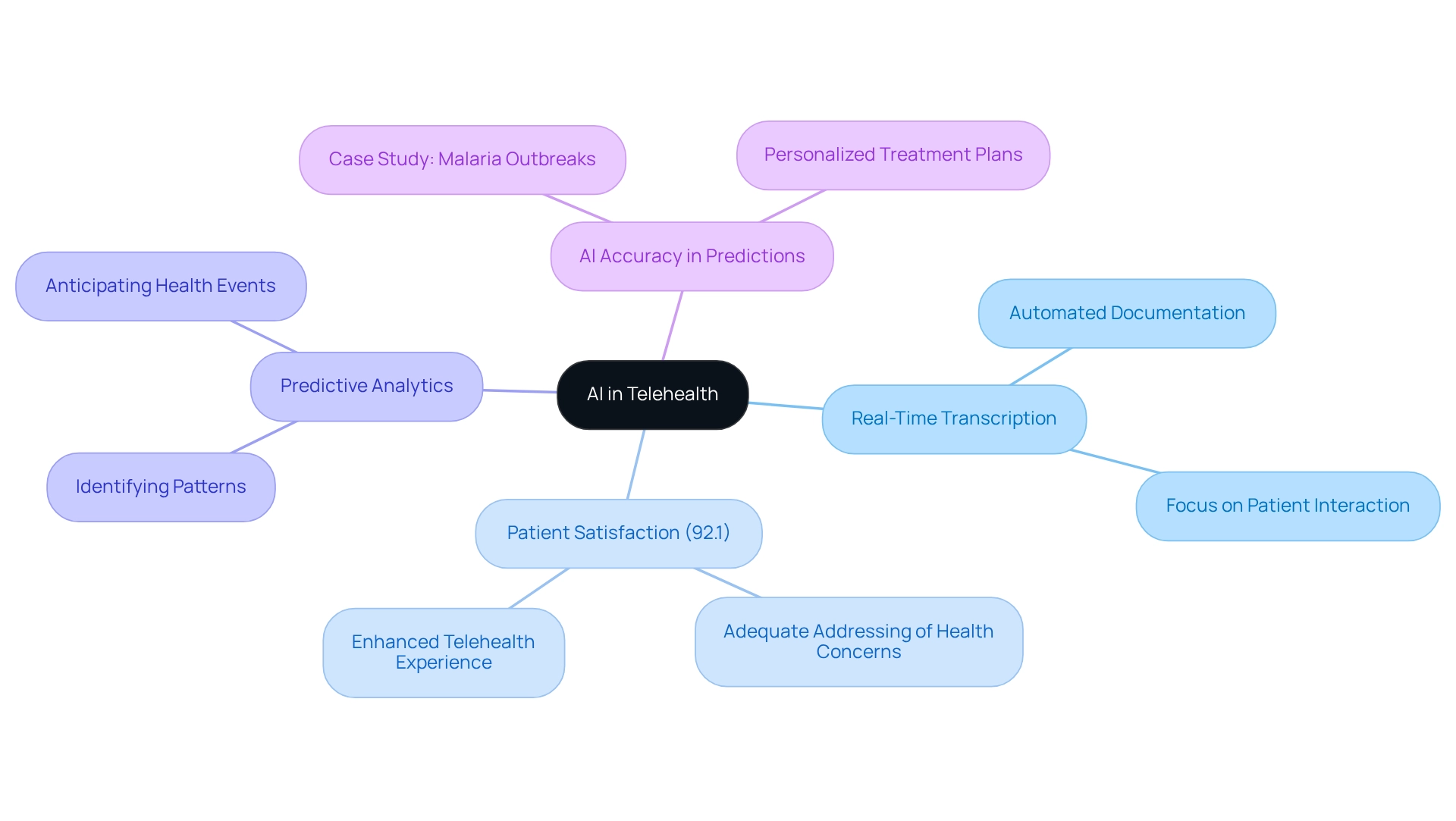
AI Billing Optimization: Maximizing Revenue for Healthcare Providers
Healthcare professionals often face overwhelming administrative burdens that can detract from their primary focus: patient care. AI-driven billing optimization tools utilizing gen health ai are here to help, transforming revenue management by accurately suggesting billing codes and uncovering missed billing opportunities. Imagine a world where advanced analytics on client interactions and historical billing data, facilitated by gen health ai, significantly enhance the precision of claims submissions, reducing the likelihood of denials. In fact, AI-enabled medical coding models have shown remarkable accuracy in code assignment, documentation, and reporting, which is essential for financial performance. This optimization not only boosts revenue but also lightens the administrative load on practitioners, allowing them to devote more time to supporting their clients. By streamlining processes such as billing, medical record management, and appointment scheduling, service providers can reclaim valuable time—ultimately enhancing patient care.
As a result, medical organizations can achieve substantial financial growth while improving operational efficiency, positioning themselves for sustained success in an increasingly complex landscape. Consider the insights from the case study 'AI's Role in ': effective resource allocation and optimized billing practices can lead to significant cost savings, including reducing hospital admissions by over 50%. This underscores the vital role of gen health ai in improving medical service delivery and operational efficiency. To fully harness the advantages of these AI tools, medical professionals should reflect on how they can integrate them into their current workflows. By doing so, they can streamline operations and enhance outcomes for individuals, ultimately fostering a more compassionate and efficient healthcare environment.
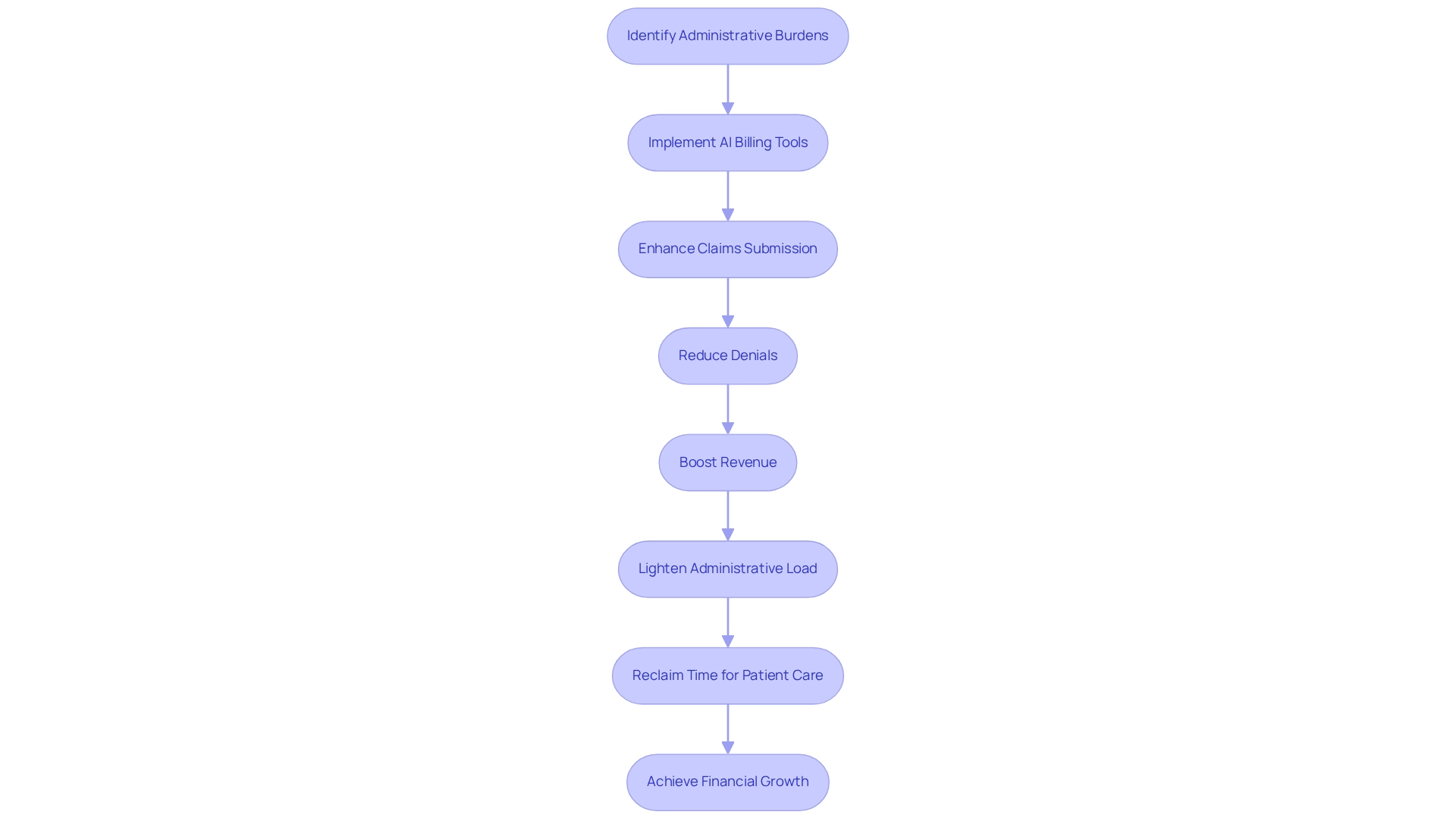
AI in Personalized Care: Enhancing Patient Outcomes Through Tailored Strategies
AI is transforming the creation of customized treatment plans, addressing the emotional challenges faced by healthcare providers. By examining individual data, preferences, and medical histories, empower medical professionals to identify the most effective treatment options tailored for each patient. This compassionate approach not only leads to significantly enhanced health outcomes but also fosters increased patient satisfaction.
Imagine the relief that comes with a customized method that enhances the quality of service while aligning with the ethical principles cherished by faith-based medical providers. Recent surveys reveal that 50% of medical leaders believe AI will improve treatment quality, reflecting a growing consensus on its advantages. Case studies, including those involving CosmaNeura, illustrate how AI-driven personalized support strategies have resulted in measurable enhancements in patient outcomes—such as decreased hospital readmission rates and increased adherence to treatment plans.
This highlights AI's potential to revolutionize medical service provision while addressing the concerns of healthcare professionals about maintaining quality treatment. Furthermore, as noted by Wolters Kluwer, 59% of medical leaders implementing generative AI are collaborating with third-party vendors to create customized solutions. This collaboration is crucial for developing tailored care strategies that resonate with the values of compassion and understanding, and by integrating gen health ai with these principles, healthcare providers can significantly enhance the overall patient experience in a faith-focused context.
How can we further embrace these innovations to ensure our patients receive the best care possible? The journey towards improved healthcare is a shared one, and your insights and experiences are vital in shaping a compassionate future.
Conclusion
The integration of artificial intelligence in healthcare is not merely a technological advancement; it signifies a profound shift in how care is delivered and experienced. Have you ever felt overwhelmed by administrative tasks? Platforms like CosmaNeura are streamlining these burdens, allowing healthcare professionals to enhance diagnostic accuracy in brain scans and bone fractures. This invaluable tool not only alleviates paperwork but also enables providers to spend more quality time with patients, nurturing a compassionate, patient-centered approach.
Moreover, AI's role in disease detection, emergency response optimization, and personalized care strategies illustrates its potential to significantly enhance patient outcomes. By identifying early signs of critical conditions and tailoring treatment plans to individual needs, AI paves the way for a more proactive and effective healthcare system. Consider the successful implementation of AI-driven tools, including clinical chatbots and billing optimization, which further demonstrate how these technologies can improve operational efficiency while upholding the quality of care.
As the healthcare landscape evolves, embracing AI solutions becomes essential for addressing challenges like physician burnout and the urgent need for timely interventions. It’s crucial to uphold a commitment to ethical practices and compassionate care as providers navigate this new terrain. With ongoing advancements and a focus on patient-centered strategies, the integration of AI is poised to transform healthcare delivery, ultimately leading to better outcomes for patients and a more fulfilling experience for providers. Let us embrace these changes together, fostering a future where technology and compassion go hand in hand.




